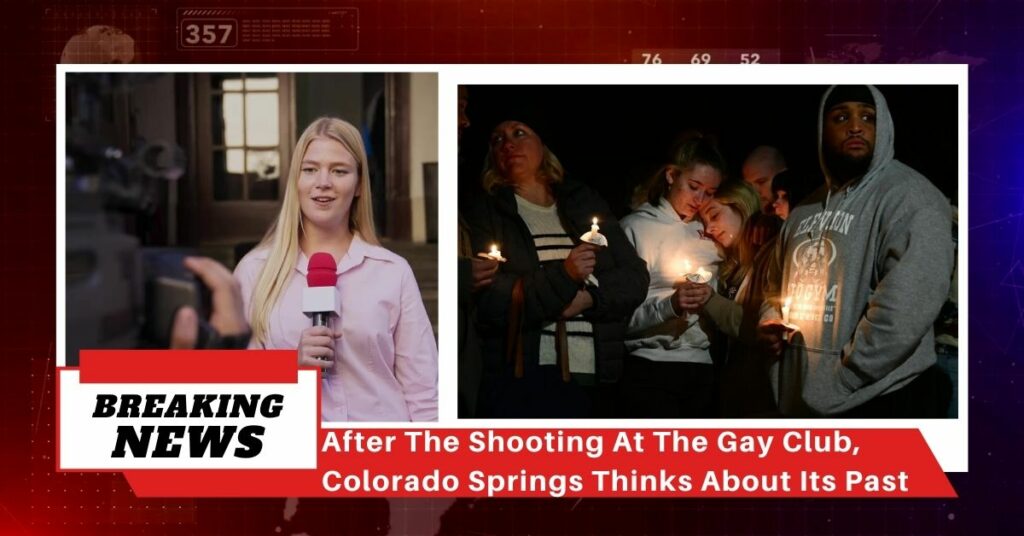When a 25-foot rainbow flag was put up in front of Colorado Springs City Hall this week, people who were there to mourn the victims of a mass shooting at a famous gay club couldn’t help but think about how just a few days earlier, such a show of support would have been unthinkable.
The city at the foothills of the Rockies is a patchwork of different social and cultural groups because its population is growing and becoming more diverse. It has art shops and breweries, big churches and military bases, a liberal arts college and the Air Force Academy. It has been advertising itself for years as an outdoor-loving boomtown that will have more people than Denver by 2050.
But the shooting last weekend has brought up uncomfortable questions about the lasting effects of cultural conflicts that flared up decades ago and gave Colorado Springs a reputation as a hotbed of religiously-based conservatism where LGBTQ people didn’t fit in with the ideas of family values held by the most vocal community leaders.
This week, some people thought it was a big deal that police were careful to use the correct pronouns when talking about the victims. For others, the shocking act of violence in a place that was known as a haven for LGBTQ people broke the feeling of hope that was all over the city, from the revitalized downtown to the sprawling subdivisions on its outskirts.
Candace Woods, a gay pastor and chaplain who has made Colorado Springs her home for the past 18 years, recently shared that the city “feels like the city is kind of at this tipping point.” “How will we decide how we want to move as a community? It feels like there’s this tension,” the speaker said. “It feels exciting and unusual.” The attack that took place over the weekend resulted in the deaths of five persons. On Friday, officials indicated that eight casualties were still being treated in hospitals.
In the last few decades, there has been a rapid increase in population, now at 480,000 people. More than one-third of the population comprises people of colour, twice as many as in 1980. The average age is 35 years old. Politics in this city tend to be more conservative than those in towns of comparable size. Discussions in the City Council centre on common topics throughout the Mountain West, such as water availability, housing cost, and the danger of wildfires.
Residents of Colorado Springs take great delight in characterizing their city as a location defined by reinvention. In the early part of the 20th century, newcomers moved around Pikes Peak to find a vacation town there. The 1940s saw the establishment of the first military bases. In the 1990s, it gained a reputation for being a home base for evangelical nonprofit organizations and Christian ministries, such as the broadcast ministry Focus on the Family and the Fellowship of Christian Cowboys.
Matt Mayberry, a historian at the Colorado Springs Pioneers Museum, said, “I have been thinking for years, we’re in the middle of a transition about what Colorado Springs is, who we are, and what we’ve become.” “I have been thinking for years we’re in the middle of a transition about what Colorado Springs is, who we are, and what we’ve become.”
Michael Anderson, a bartender at Club Q who survived the shooting over the weekend, was attracted to the city partly because he saw it as a place with a promising future. Anderson was able to secure a job at Club Q and connect with his “gay family” in his new community with the assistance of two pals, Derrick Rump and Daniel Aston. It was friendlier than the remote area of Florida in which he had grown up.
Nevertheless, he pointed out indicators that the city was culturally more conservative than other cities of comparable size and the majority of the state of Colorado. “Colorado Springs is kind of an outlier,” he said. Now, he is mourning the loss of his friends Rump and Aston, who was killed in the club shooting.
Leslie Herod went in the opposite direction. After growing up in a military family in Colorado Springs, like many other people in the city, she moved to Boulder to attend the University of Colorado. In 2016, she was the first openly lesbian, gay, bisexual, or transgender Black person to be elected to Colorado’s General Assembly. She represents a part of Denver. She’s now running for mayor of Denver.
“Colorado Springs is a place where people love each other. “But I will also say that I chose to leave the Springs because I didn’t feel like the elected leadership and vocal leadership in this community were supportive of all people, including Black people, immigrants, and LGBTQ people,” Herod said at a memorial event in downtown Denver.
She said that Club Q was where she met people when she came home from college. But she didn’t forget that people and groups who had been anti-LGBTQ in the past still had a say in how the city was run. “This neighbourhood, like every other in the country, is complicated,” she said.
Please share your ideas in the comments area if you enjoyed this article. And remember to check back here, Journalistpr.com. for updates.

